The Importance of Keyword Research in 2024 [Free Template]
Do you write content because you like to topic or because people have a need for it?
There is a time and place for pretty much anything.
Having a balance is important, though.
I’ve seen Bloggers, Business Content Writers, Content Creators, teams with a strong Inbound Marketing Strategy produce a ton of highly valuable content.
But the number of organic search visits remained low.
Why?
Many creatives produce content about what they like to express. They have a passion for what they do and want to share it with the world.
In their minds, Google should just understand what the content is about and index it accordingly based on the quality and relevance.
Unfortunately, that’s not what actually happens.
In this article, I’m going to help you find the balance between content you want to create and content people actually search for and thus brings you organic traffic.
Your creations deserve to be seen!
Doing your keyword research will help a lot. I’m going to walk you through it step-by-step, provide you with a simple and advanced way of doing keyword research and a template / sheet so you can get started right away.
Related: How to Conduct an Effective SEO Audit
Let’s begin!
In this article
- What is keyword research
- The importance of keyword research
- How to improve your Content Marketing with keyword research
- Which Keyword research tools should you use
- Keyword research made easy
- How to find even more keywords for your research
- How to select keyword with the highest potential from your long list
- Advanced keyword research strategies
- Get our Keyword Research Template for free
- FAQ
What is keyword research
Keyword research is the process of understanding what your target audience searches for and how you should prioritise content you create next.
Of course, there are various keyword research definitions on the internet. I find this one to be fitting.
I hope that after reading this article, you’ll understand why.
The importance of keyword research
In a perfect world, we would love it if our content would be indexed by search engines based on the quality and relevance.
We might get there one day. But we need to help search engines understand what our content is about. On-Page SEO optimization helps, but you will need to understand which keywords you are targeting and mention those keywords in your article.
You also need to understand IF people are actually searching for the topic you want to write about and how difficult it would be to rank for that topic / keyword.
Keyword research helps you to understand, prioritize and take the right action.
How to improve your Content Marketing with keyword research
At StoryLab.ai, we’ve created a Growth Storytelling Framework where multiple aspects of Content Marketing and Growth come together.
Keyword research sits in the middle of the framework. You first need to understand your purpose and have a Content Marketing Strategy mapped out, then you can conduct your keyword research, have a list of ideas, create content, and distribute your creations.
You can access it here for free.
No email signup is needed.
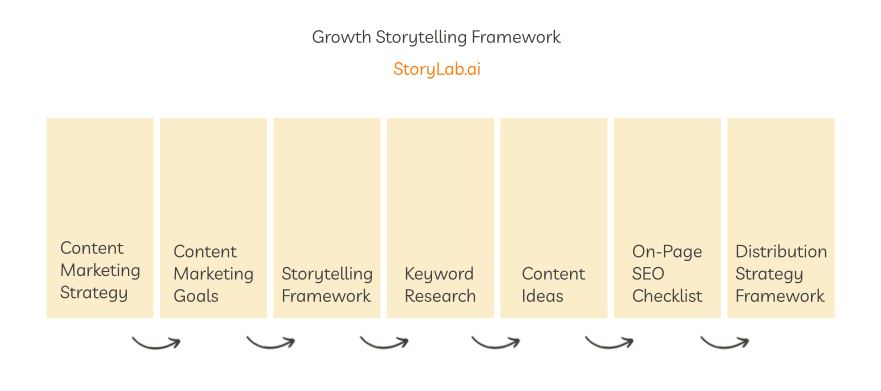
You can write content based on valuable keywords and be successful.
But having a sound Content Marketing Strategy, telling a story with your content and a Content Distribution Strategy will help you achieve your goals so much better.
Which Keyword research tools should you use
Alright.
To conduct your keyword research, you will need tools. There are paid and free tools which you can pick from.
If you’re like me and you use multiple SEO Tools, then you’ll notice when conducting your keyword research that different tools sometimes give you different insights.
So let’s start with that.
The is no perfect keyword research tool. You can have your favorite based on how you can create a long list of potential keywords, how you can filter based on search volume, competition, etc. but you won’t get perfect data. If a tool mentions that the competition is low, it does not mean that it’s going to be very easy to rank for that keyword.
That being said, these tools are still very valuable and I would feel very blind not being able to use them.
My personal favorite keyword research tool is Semrush.
Keyword research made easy
First, we’re going to showcase how you can easily conduct a keywords research.
If you’re new to this, I would advise to start with the simple option.
In the Google Sheet Template, you can easily skip the more advanced rows for now and start filling those in when you feel comfortable.
1. Define your audience and topics
If you follow the Growth Storytelling Framework, you see that the Content Marketing Strategy comes before the keyword research.
This is because you first need to understand who your audience is and learn as much as possible about them before you start creating content tailored to their needs.
If you have already defined your audience and their needs, you can move on to the next step. If you have not yet, I would advise to do so first and note it down in the Content Marketing Strategy tab.
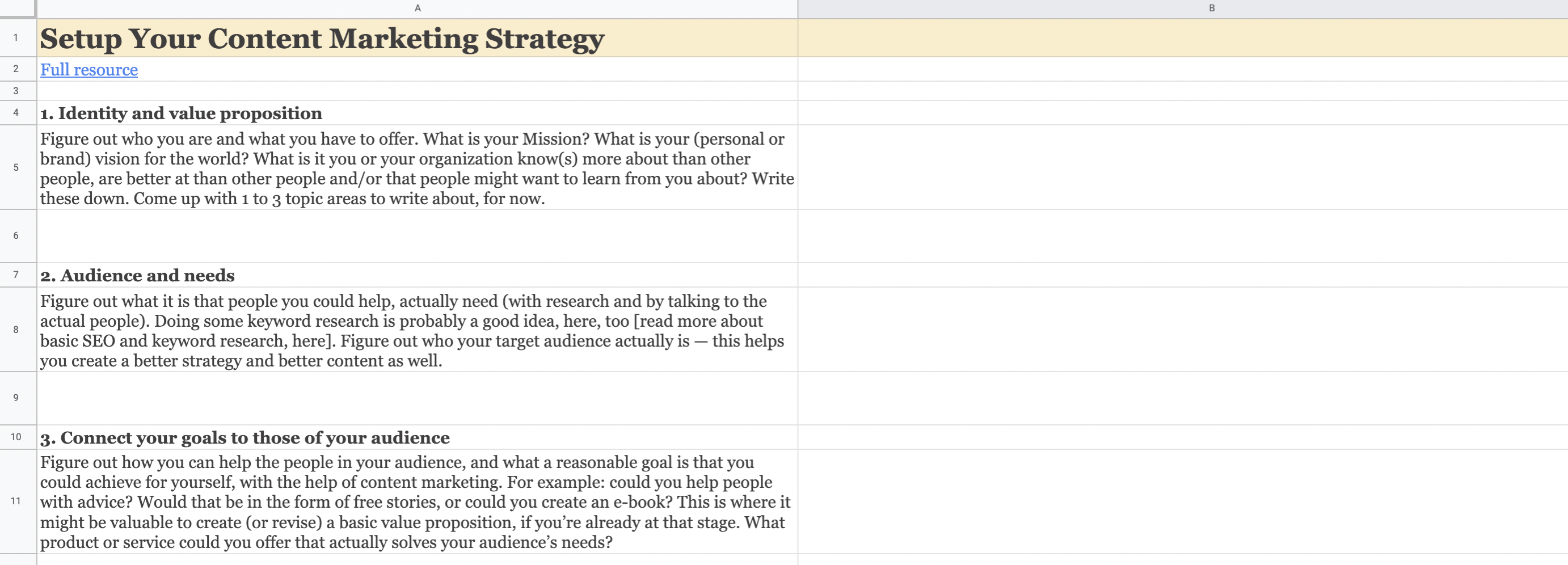
2. Create a long list of relevant keywords
After identifying your audience and topics, you can start creating a long list of keywords.
Simply start with a topic and try to find as much information about it as you can.
In our example, we’re going to try to identify opportunities for our Blog Title Generator.
We know we want to promote it by attracting quality traffic to it, but are not sure how.
First thing we do is enter the main topic in SEMRush:
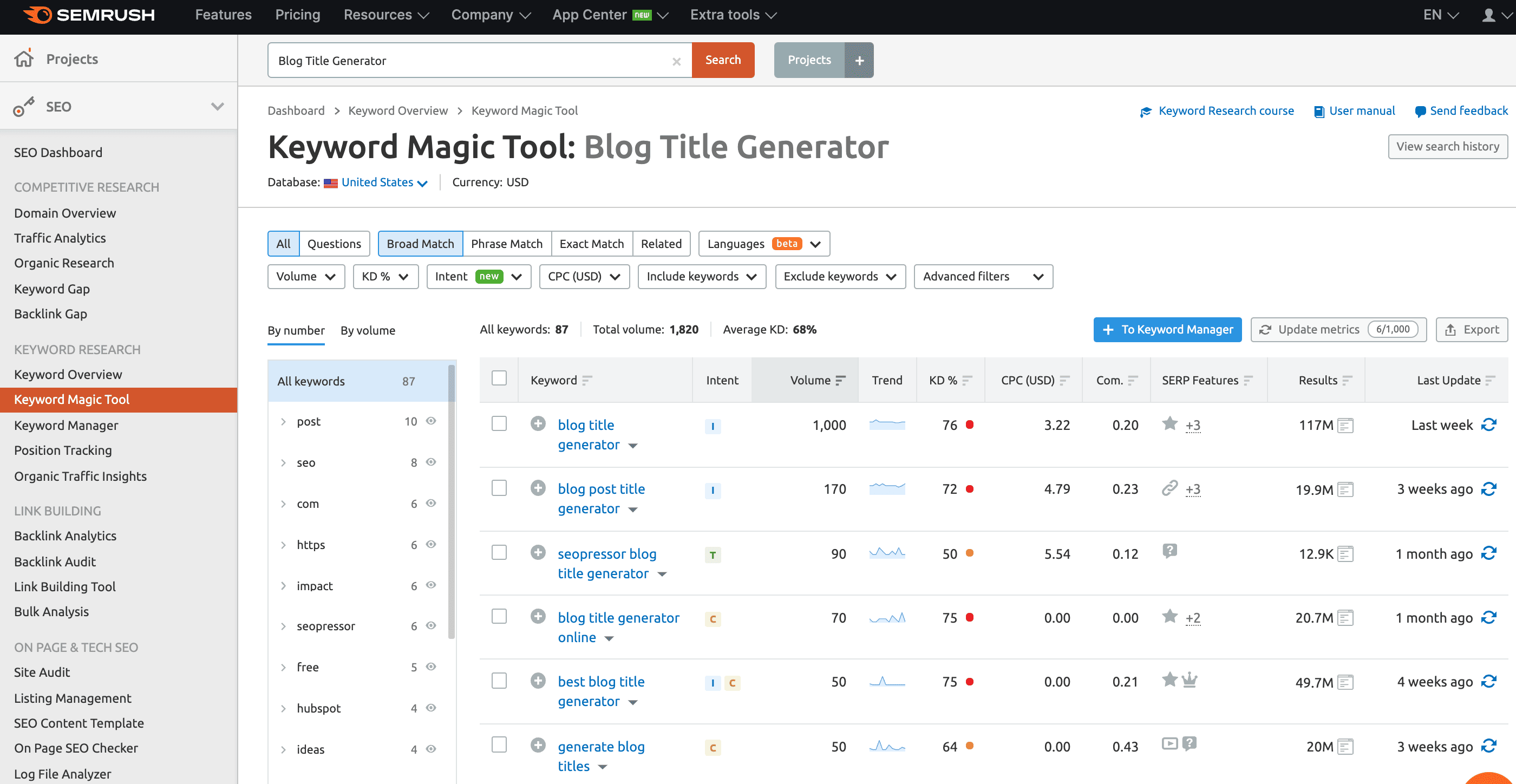
We then start to copy / paste relevant keywords into our template / sheet.
I would advise to:
- Only add keywords are make sense. We want a long list of opportunities, but if you know it’s not relevant, don’t add it to your list.
- Add keywords that are relevant but don’t have potential. This helps you avoid wondering if a keyword might have potential later. You can find it in your sheet and see that it’s not the case.
- Cluster relevant keywords to make it easy to select keywords with the most potential for any given article.
A bit of background on search volume data for most Keyword Tools
- Volume is the number of searches, not the number of people who searched. There are cases where someone might search for a keyword multiple times a month (e.g., “weather in New York”). These searches contribute to the search volume, even though it’s the same person doing them.
- Volume doesn’t tell you how much traffic you’ll get by ranking. Even if you manage to rank number one, your traffic from a keyword will rarely exceed 30% of this number. And that’s if you’re lucky.
- It’s an annual average. If there are 120k searches for a keyword in December and none for the remaining eleven months of the year, it’s monthly search volume will be 10k (120k / 12 months).
3. Add subtopic and close to core business if it makes sense
Sometimes it’s easier to filter through the list if you add sub topics. Add them when it makes sense or delete the row if it does not make sense to you.
The same thing goes with the row ‘Close to core business’.

4. Find out what the search intent is
Now it’s time to gather some soft data. You don’t need to look up every single keyword. Just the ones that have the highest potential.
You won’t get this data from the keyword research tools mentioned above.
It’s time to actually do a Google search for the keywords you think have the post potential and pay attention to the following:
Content type
In general, what type of content has been created / is ranking on top?
- Blog posts
- Product pages
- Category pages
- Landing pages
- Videos
Commercial intent
Are the results in general:
- Informational (searching for information)
- Navigational (searching to find a particular page)
- Commercial (searching to compare and find the best products / services)
- Transactional (searching to do something. Buy a product, order something)
How to find even more keywords for your research
Congratulations!
You have concluded all steps and created your initial keyword research.
The question is. Do you think that you enough data to start creating content or do you think you might be missing a couple of hidden gems?
You do know that hidden gems are the real gems. Those are the keyword combinations that are hard to find. Your competitors might have missed them 😉
If you want to go that extra mile, here’s how you can find more keyword ideas.
Every time you find a new idea, insert them in the keyword research tool and get the data and additional ideas.
1. Find seed keywords using Google’s autocomplete
Simply go to Google, insert a keyword and don’t click ‘find’. Google will autocomplete your sentence.
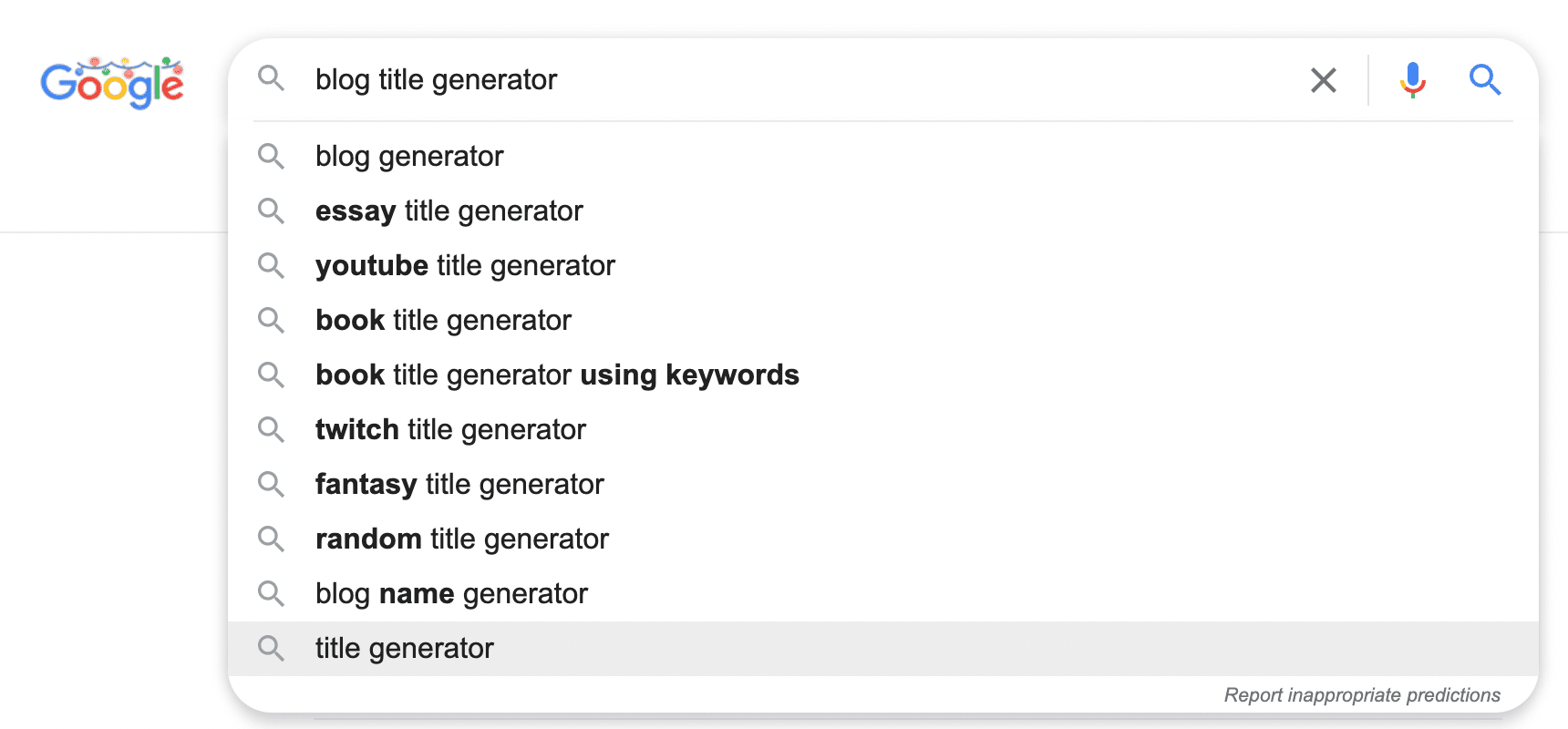
Be creative with your inputs. Add more or fewer words, insert keywords from the list you already have and find those gems.
Get even more ideas by adding a space before the keywords:
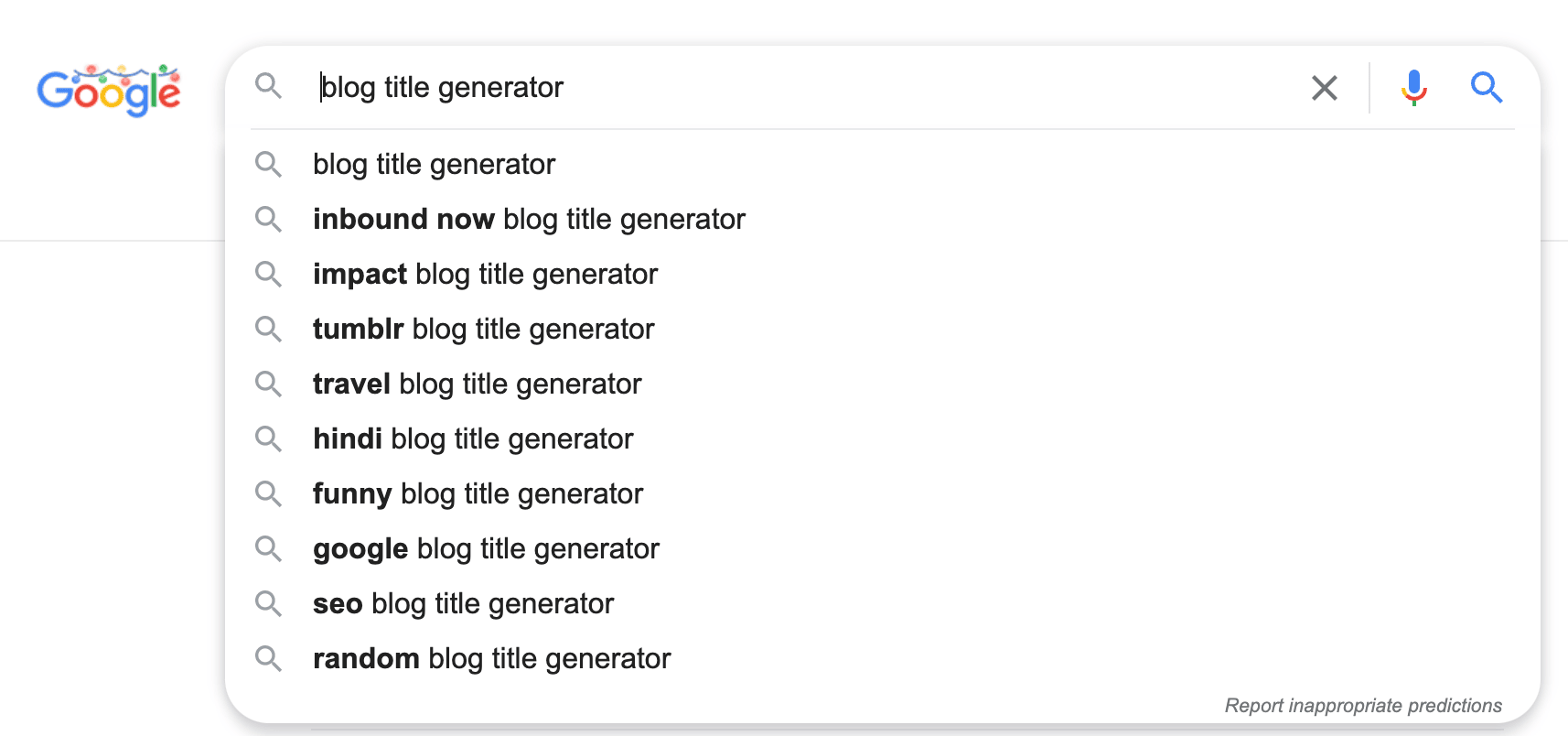
2. Find seed keywords using Google’s related searches
The next thing you can do is scroll down on Google to the related searches and get even more ideas:
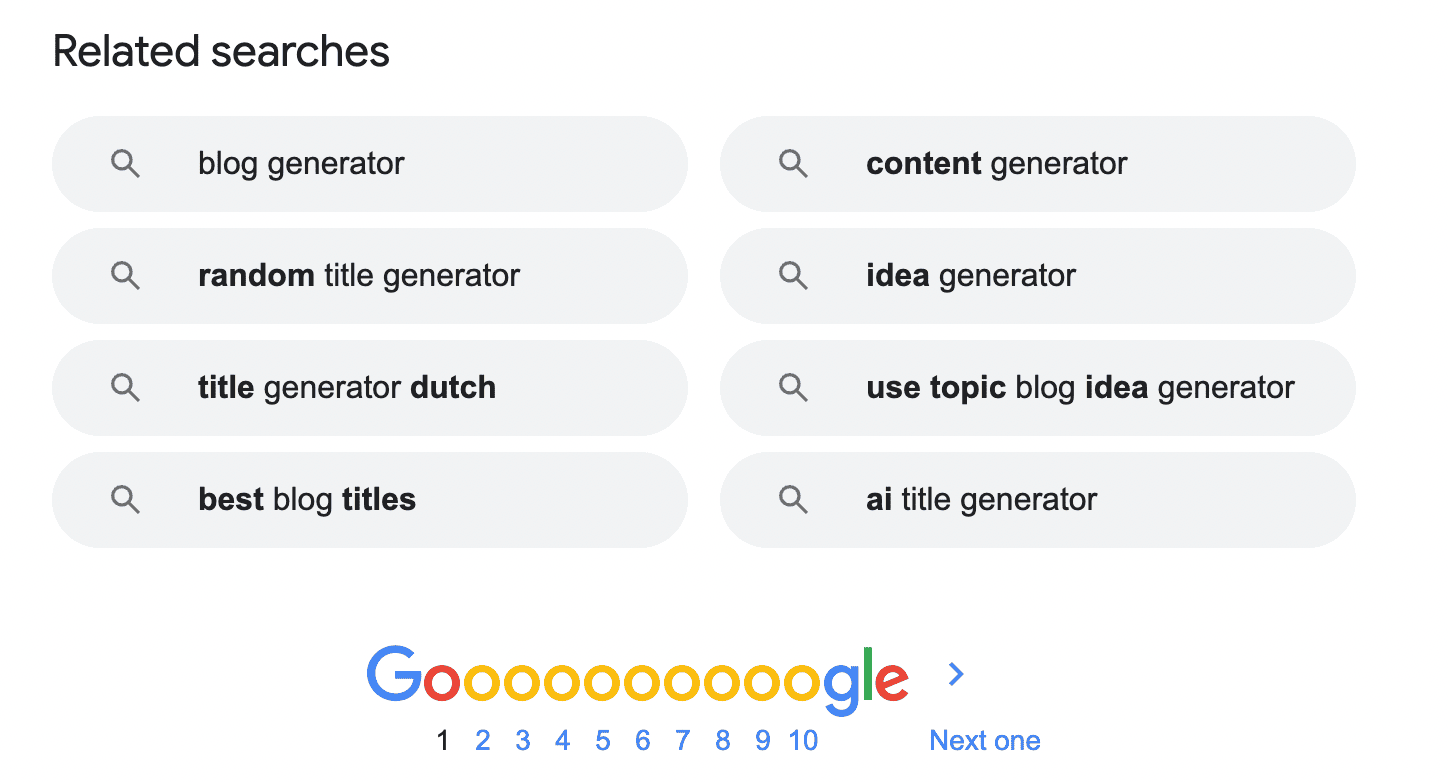
After you’ve looked up all the ideas in your keyword tool, you can click on a related search results, scroll down and get new ideas.
Just beware that you don’t get trapped in the rabbit hole.
How to select keyword with the highest potential from your long list
Ok. It’s time to have a look at your keyword research and select the first article you want to write about.
How do you do that?
Here’s a general rule of thumb that I use:
- Which topic will drive the most business success? (Blog Title Generator, Social Caption Generator, Content Idea Generator)
- From that topic, which keyword combination is most likely to bring the most quality traffic? (Lowest competition / highest search volume ratio and right commercial intent)
- Do I already have content around this topic / am I planning to create more content around it? If yes, you can opt in for higher competition keywords. If no, (standalone piece of content) you should probably shoot for a less competitive keyword.
- Looking at the top results. Am I able to create content that’s 10x better? I would always aim to create content that’s better than what’s already in the top results. If you can’t make that happen, it will be very difficult, next to impossible to rank well and keep your ranking.
Advanced keyword research strategies
After you’ve mastered the steps for your simple keyword research, you can start with adding an additional layer.
For a more advanced keyword research strategy you can also have a look at:
1. The organic traffic potential of a content page
A page never ranks for one keyword. Even though you start creating an article with a main keyword and secondary keywords in mind, you will probably end up ranking for hundreds or thousands of long tail keywords. At the same time, some search results are more competitive because of Knowledge graphs, a high number of ads, ect. So even if you become the number one result in Google. You often don’t receive more than 30% of the clicks.
So how do you try to determine the success of a piece of content before you invest your resources?
You simply input the best performing articles for that keyword in SEMrush or Ahrefs and check what their traffic estimation is and which keywords they have included (you might also want to do that).
So this advanced keyword research strategy can only be done with paid accounts. Here’s how it can look like:
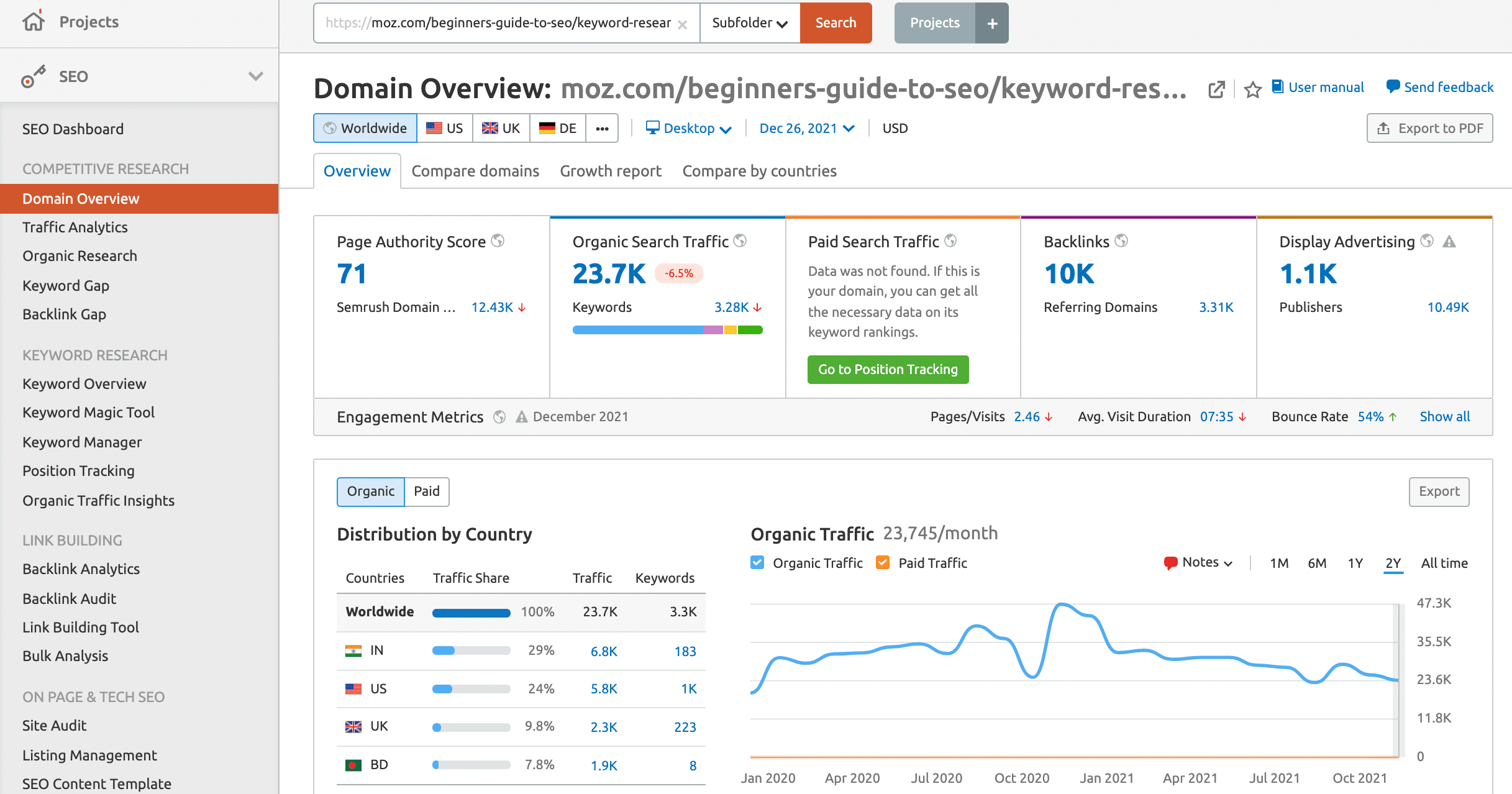
Moz ranks number 1 for the keyword ‘Keyword research’.
I’ve used their page to see how much traffic they are getting each and every month to see what I can expect if my article becomes the number one result.
2. Plan content hubs instead of individual articles
Standalone articles without quality internal links and hardly ever do well. Google favors websites that are an authority on a subject. How can you expect to rank well on, for instance an SEO topic if you’ve only written one article about SEO, while others have written hundreds or thousands of articles?
After you’ve conducted your keyword research. Plan ahead. Select a topic and think about all the articles you can write, what the main and secondary keywords will be, how you will interlink them, etc.
Get our Keyword Research Template for free
You can access it here for free.
No email signup is needed.
FAQ
What is keyword research in SEO?
Keyword research is the process of finding and analyzing search terms that people enter into search engines with the goal of using this data for a specific purpose, often for search engine optimization (SEO) or general marketing.
Why is keyword research important for SEO?
Keyword research is vital for SEO as it helps identify the terms and phrases to target for optimization, understanding what audiences are searching for, and how to cater to their needs.
How is keyword research conducted?
Keyword research is conducted by using tools like Google Keyword Planner, SEMrush, or Ahrefs to find keyword ideas, analyze their search volume, competition, and relevance to the content.
What are long-tail keywords and their significance in SEO?
Long-tail keywords are longer and more specific keyword phrases. They are important in SEO for targeting niche demographics, having less competition, and often having higher conversion rates.
Can keyword research impact content strategy?
Yes, keyword research directly impacts content strategy by identifying topics that are of interest to the target audience, guiding the creation of relevant and searchable content.
What role does competitor keyword analysis play in keyword research?
Analyzing competitors’ keywords helps in understanding what is working in your industry, identifying gaps in their strategies, and finding opportunities to target missed or underutilized keywords.
How often should keyword research be conducted?
Keyword research should be an ongoing process, adapting to market trends, changes in consumer behavior, and updates to search engine algorithms.
What are the challenges of keyword research?
Challenges include keeping up with changing search trends, understanding the intent behind keywords, and finding the balance between high-volume and niche keywords.
Can keyword research tools suggest content ideas?
Many keyword research tools offer content ideas based on the keywords, showing what types of content are ranking for those keywords and suggesting gaps you can fill.
How does keyword research benefit PPC campaigns?
In PPC campaigns, keyword research helps in targeting ads to the right audience, improving click-through rates, and managing advertising costs by focusing on the most effective keywords.
Related articles
Author bio:
 Raul Tiru: Raul loves to build companies and help startups and scale-ups grow. Raul started his first website when he was 17 years old, has held several growth marketing positions in fast-growing companies, and has helped companies via his Freelance Marketing services. You can find Raul on his community GlobalOwls where he helps Nonprofits and Startups to do better marketing.
Raul Tiru: Raul loves to build companies and help startups and scale-ups grow. Raul started his first website when he was 17 years old, has held several growth marketing positions in fast-growing companies, and has helped companies via his Freelance Marketing services. You can find Raul on his community GlobalOwls where he helps Nonprofits and Startups to do better marketing.
Master the Art of Video Marketing
AI-Powered Tools to Ideate, Optimize, and Amplify!
- Spark Creativity: Unleash the most effective video ideas, scripts, and engaging hooks with our AI Generators.
- Optimize Instantly: Elevate your YouTube presence by optimizing video Titles, Descriptions, and Tags in seconds.
- Amplify Your Reach: Effortlessly craft social media, email, and ad copy to maximize your video’s impact.